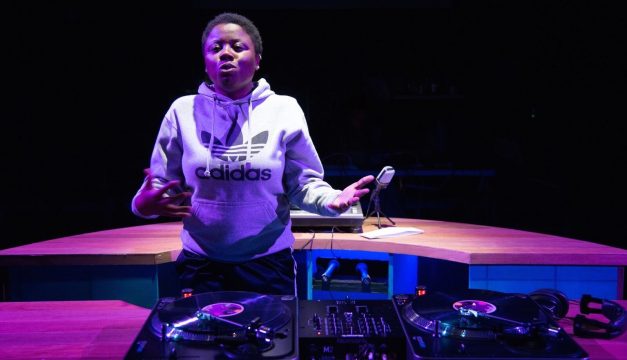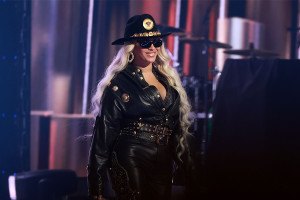THEATER REVIEW: Hip-Hop and Youthful Hope in How We Got On

Jerrik Medrano and James Whitfield in How We Got On at Azuka Theater. (Photo by Johanna Austin)
We hear a lot about the graying of audiences for live theater and concerts — that the average age keeps going up. If it’s true, and the trend continues, the implications are dire. (Hey, when I look around and I’m in the younger half of the crowd, I know we’re in trouble!) But few companies seem to be willing or able to address it head-on.
Then there’s Azuka. Their mission, explicitly stated, is to give voice to people whose stories go unheard. Last season, this focus seemed very specifically to include young people. Two of their shows — Local Girls and Moth — were about teenagers. The latter in particular had a rare sense of authenticity. Continuing this trajectory, Azuka opens with How We Get On, a four-character coming of age story, written by Idris Goodwin and directed with spirit by Raelle Myrick-Hodges.
There’s an agreeably loose, open, sometimes improvised feeling to How We Get On, a show that specifically uses hip-hop and rap, both directly and metaphorically. But make no mistake — this is a play, and a rather ambitious one. On one level, it presents a historical overview of the rise of hip-hop (How We Get On is set in 1988). It’s also and more centrally the story of three teenagers — Hank, Julian, and Luanne — who, sometimes as together, sometimes separately as rivals, embark on their own performance dreams. Our on-stage guide through this story is a combination narrator/DJ named Selector (actor Zoe Richards, very good in the show’s most polished performance).

Zoe Richards in How We Got On at Azuka Theatre. (Photo by Johanna Austin)
Media depictions of hip-hop culture often focus on the glamorous, violent, and lurid backstories. What I enjoyed most about How We Get On is the complete absence of this. Here, in a new spin on classic theme, we watch these entirely likeable young people striving for personal fulfillment through this creative outlet. The actors in the leads – Jerrick Medrano (Hank), James Whitfield (Julian) and Kishia Nixon (Luann) give endearing performances. All three are themselves embarking on professional careers, and the signs point to success.
How We Get On is refreshingly sincere and free of cynicism. Ultimately, it would benefit from some tightening, and a stronger ending. But it’s a very winning 80 minutes.
Full disclosure: I know very little about hip-hop and rap. I learned a lot from How We Got On, and probably missed quite a bit, too. But then, I’m not the target audience. Looking around the room, it was clear I was definitely not in the younger half of the crowd.
And that’s a good thing.
How We Got On plays through October 9. For more information, visit the Azuka Theatre website.


